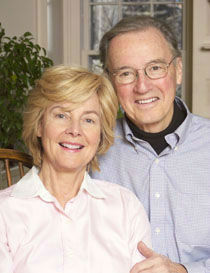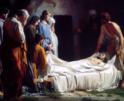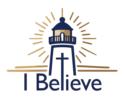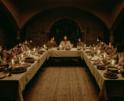
Faith
Churchgoers, like it or not, live and breathe in our secular -- dare we say "godless" -- culture, and we kid ourselves if we think we are not affected by it.

Ryan
Religion is all over the news these days. Much of it makes for tough reading. For instance, the recent study by Pew Research Center's Forum on Religion and Public Life reported on the exploding number of people who have left America's churches. In just 10 years, from 2009 to 2019, the percentage of American Christians has shrunk from 77 percent to 65 percent. That's a 12 percent decline in 10 years!
Pew analyzed its data by the age of the survey respondents and found that one in five U.S. adults have no religious affiliation. Most striking has been the finding concerning American millennials, those aged 18 to 30. Fully a third claim that they have no religious affiliation at all. According to Bishop Robert Barron, the figure among young Catholics is upwards to 50 percent. The same study found that atheists and agnostics knew more about religion than those who claimed religious affiliation!
Anyone who watches youth-oriented media, such as Saturday Night Live, knows that organized religion is a prime bull's eye for mockery. Commentators and columnists are having an open-season attack on the same target. A recent New York Times column by Timothy Egan, entitled "Why People Hate Religion," is a screed about the fakery and sins of America's church leaders. No surprise, the leadership of the Catholic Church is a prime target of the author's attack.
And anti-religious views are beginning to enter politics openly. The recent Democratic debate for the presidential nomination featured an ad by Freedom From Religion directly attacking the work of religion in the public square. The message was delivered by the late President Reagan's son who grinningly signed off "Ron Reagan, life-long atheist, not afraid of burning in hell."
One doesn't have to be a media specialist or sociologist of religion to observe the fading of church attendance, especially here in New England. A trip to Sunday Mass these days means dodging platoons of runners and cyclists and passing cars packed with families off to soccer league events, only to find a scattering of the regulars in the pews. The grey- and white-haired are the many, and the post-confirmation teens are the few.
A recent article in First Things, entitled "Belief Limbo," attempts to explain this abandonment of organized religion by so many Americans. The physician-author, Robert Dworkin, states, "Today's religiously unaffiliated separate into two groups: determined atheists hostile toward religion, and a much larger group of people who are unsure, uninterested, undecided, or just too busy for religion, and who live in 'belief limbo.'" This hit home to us, since two of our close family members, beloved brothers, reflect this trend. One, educated through college in Catholic institutions, embraced atheism after his marriage fell apart and he married a militant atheist.
The other brother seems to have just slipped away and hasn't received the sacraments for three decades. Curiously, when he collapsed at work 15 years ago and was rushed to a hospital by the EMTs, he reported a great sense of calm, assured that "God was waiting for him at the Pearly Gates." And when he recovered shortly after, God again slipped back into the background. His theological position is quite common these days: ours is an all-loving God, but one unconcerned with human accountability -- and particularly, with my accountability.
Our Church seems to be filled with Dworkin's "Belief Limbo, the unsure, uninterested, undecided, or just too busy for religion." A Catholic writer of comic novels, whose name has slipped down the memory hole, described himself as "a Catholic on vacation." Many of our friends, who have "gone on vacation," appear now to have transitioned from vacation to retirement.
Churchgoers, like it or not, live and breathe in our secular -- dare we say "godless" -- culture, and we kid ourselves if we think we are not affected by it. Our powerful secular culture continually celebrates the free-thinking individual, and, on the other hand, it promotes a cynical attitude toward our major institutions. For example, since 1970, Americans' distrust of Congress has gone from 14 percent to 47 percent; and for the medical profession from a mere 4 percent to 27 percent. For organized religion, distrust has grown from 11 percent to 27 percent.
But "religion" is a special case, and this is a source of confusion in many peoples' minds. Whether in a dictionary or our individual minds, the term "religion" has two distinctly different meanings. One refers to organized religion: a particular system of faith and worship with liturgy, physical churches, clergy, and a bureaucratic structure. The other meaning is more individual and personal: the belief in and worship of a superhuman controlling power, especially a personal God or gods. Both meanings are essential, and both co-exist in our minds and heart.
For Catholics, the work of our Church, our system, is to assist us in our primary human goal: to know and love God. The Mass and the sacraments are there to assist us in this mission of forging a relationship -- a connection -- with our creator. The Church teaches us through words and metaphors. Our Catechism lays out this mission: to know, love, and serve God in this world and the next. The life and death of Christ and the example of our saints are there to inspire our actions. So, too, is the fellowship of a parish community. All the good and bad headlines about the institutionalized Church may be interesting or upsetting, but it is just noise.
We need our institutionalized Church, our organized religion, but the essential task of reaching our primary goal is still ours alone.
- Kevin and Marilyn Ryan, editors of "Why I'm Still a Catholic," worship at St. Lawrence Church in Brookline, Mass.
Recent articles in the Faith & Family section
-
Holy Thursday and Good FridayFather Robert M. O'Grady
-
Faith is a verbArchbishop Richard G. Henning
-
Giving Mothers and Babies a Chance in the MissionsMaureen Crowley Heil
-
'The Chosen: Last Supper' premieres in Dallas, bringing Holy Week to the big screenFather Patrick Briscoe
-
Be free: Experiencing the promise of the Jubilee YearDr. R. Jared Staudt























